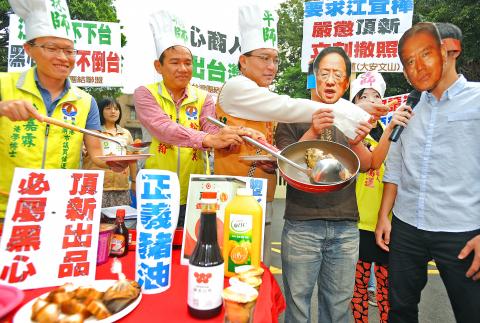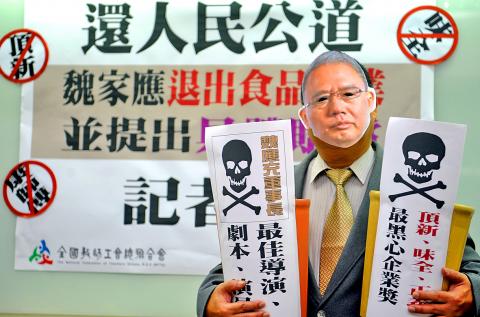Amid the snowballing oil scandal centering on the Ting Hsin International Group (頂新集團) food manufacturing giant, the Ministry of Finance yesterday announced that it would stop any attempts by the group to increase its stock holdings in banks and Taipei 101.
Vice Minister of Finance Wu Tang-chieh (吳當傑) said the ministry has expressed to Cathay Financial Holdings (國泰金控) and CTBC Financial Holding Co (中信金控) its determination that Ting Hsin would not obtain management over the skyscraper and that both financial groups have agreed to follow the ministry’s stance.
The board managing Taipei 101 is to be elected next year and Ting Hsin reportedly hoped to become the largest shareholder and thus, manager. Currently, Ting Hsin holds the second-largest share of the building’s stock, after the government’s 44 percent. Cathay Financial and CTBC Financial hold 7.73 percent and 6.12 percent respectively.

Photo: Chu Pei-hsiung, Taipei Times
“We had not thought that Ting Hsin and its subsidiaries could have betrayed consumers to this level,” Chinese Nationalist Party (KMT) Legislator Alex Fai (費鴻泰) yesterday said, referring to the widening cooking oil scandal.
On the Wei (魏) family’s — Ting Hsin Group’s founders — investment in Taipei 101, Fai said he would be keeping a close eye on the group so it is not allowed to manage the building.
As for the group’s other investments and attempts to buy out banks and China Network Systems Co (CNS, 中嘉網路), Fai said that financial groups should be wary that Ting Hsin would tunnel its money from the banks.

Photo: Chang Jui-chen, Taipei Times
That said, Fai asked banks to reconsider loans to the Wei family over the family’s purchase of units within Taipei’s The Palace (帝寶) luxury apartment complex, saying that the family may attempt to transfer ownership to other accounts and hide their assets.
Meanwhile, as more local governments and consumer groups echoed the call to boycott products from Ting Hsin and its subsidiaries, a number of public and private universities, including National Taiwan University, National Chengchi University, National Taiwan Normal University and Soochow University, also joined the boycott.
Other universities, such as National Chiao Tung University, National Cheng Kung University (NCKU) and Ming Chuan University said they complied with Ministry of Education’s announcement by offloading products that have been identified by the Ministry of Health and Welfare as problematic.

Photo: Chang Chia-ming, Taipei Times
According to NCKU secretary-general Chen Chin-cheng (陳進成), having a general boycott of Ting Hsin and its subsidiary companies’ products was “a little too passionate” a response, adding that laws should be amended so the government can better protect the public’s interests.
Elsewhere, all products from Wei Chuan Foods Corp (味全食品工業), also a subsidiary of Ting Hsin, went off the shelves of Taipei’s schools, related cooperatives and social organizations.
“This restriction will remain in place until related agencies have cleared up all concerns,” Taipei City Department of Education spokesman Chen Shun-ho (陳順和) said.
The company’s juice and milk products are to be most affected by the city’s decision, as the firm had provided more than 18,000 bottles of milk to the school system each week — 15 percent of the school system’s supply, he said.
As the city provides free milk once a week to all elementary-school students, he said some schools would be unable to provide milk to students this week and the city is working to obtain new suppliers by next week.
Separately, National Federation of Teachers’ Unions president Chang Hsu-cheng (張旭政) said that Ting Hsin should exit domestic markets entirely.
“The company has betrayed Taiwanese people’s trust in it by selling adulterated products,” Chang said, adding: “The Wei family should donate more than NT$10 billion [US$328.87 million] to the establishment of a food security foundation fund.”
The union added that today it would submit an appeal to the Control Yuan for an investigation of the Ministry of Health and Welfare to determine whether it has neglected its duty.
Additional reporting by Abraham Gerber

The Ministry of Foreign Affairs (MOFA) yesterday said it is closely monitoring developments in Venezuela, and would continue to cooperate with democratic allies and work together for regional and global security, stability, and prosperity. The remarks came after the US on Saturday launched a series of airstrikes in Venezuela and kidnapped Venezuelan President Nicolas Maduro, who was later flown to New York along with his wife. The pair face US charges related to drug trafficking and alleged cooperation with gangs designated as terrorist organizations. Maduro has denied the allegations. The ministry said that it is closely monitoring the political and economic situation

UNRELENTING: China attempted cyberattacks on Taiwan’s critical infrastructure 2.63 million times per day last year, up from 1.23 million in 2023, the NSB said China’s cyberarmy has long engaged in cyberattacks against Taiwan’s critical infrastructure, employing diverse and evolving tactics, the National Security Bureau (NSB) said yesterday, adding that cyberattacks on critical energy infrastructure last year increased 10-fold compared with the previous year. The NSB yesterday released a report titled Analysis on China’s Cyber Threats to Taiwan’s Critical Infrastructure in 2025, outlining the number of cyberattacks, major tactics and hacker groups. Taiwan’s national intelligence community identified a large number of cybersecurity incidents last year, the bureau said in a statement. China’s cyberarmy last year launched an average of 2.63 million intrusion attempts per day targeting Taiwan’s critical

‘SLICING METHOD’: In the event of a blockade, the China Coast Guard would intercept Taiwanese ships while its navy would seek to deter foreign intervention China’s military drills around Taiwan this week signaled potential strategies to cut the nation off from energy supplies and foreign military assistance, a US think tank report said. The Chinese People’s Liberation Army (PLA) conducted what it called “Justice Mission 2025” exercises from Monday to Tuesday in five maritime zones and airspace around Taiwan, calling them a warning to “Taiwanese independence” forces. In a report released on Wednesday, the Institute for the Study of War said the exercises effectively simulated blocking shipping routes to major port cities, including Kaohsiung, Keelung and Hualien. Taiwan would be highly vulnerable under such a blockade, because it

UNDER WAY: The contract for advanced sensor systems would be fulfilled in Florida, and is expected to be completed by June 2031, the Pentagon said Lockheed Martin has been given a contract involving foreign military sales to Taiwan to meet what Washington calls “an urgent operational need” of Taiwan’s air force, the Pentagon said on Wednesday. The contract has a ceiling value of US$328.5 million, with US$157.3 million in foreign military sales funds obligated at the time of award, the Pentagon said in a statement. “This contract provides for the procurement and delivery of 55 Infrared Search and Track Legion Enhanced Sensor Pods, processors, pod containers and processor containers required to meet the urgent operational need of the Taiwan air force,” it said. The contract’s work would be